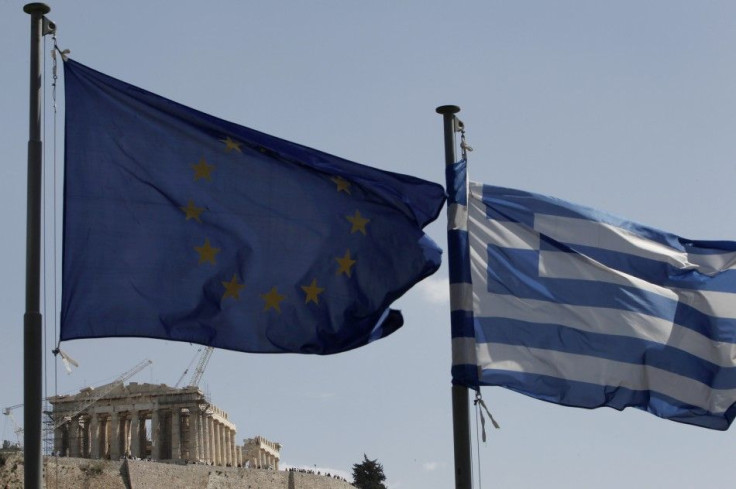Greece Bailout: Latest Eurozone Move Not Enough to End Crisis
ANALYSIS

The Greek debt crisis continues to worsen, submerged in an ocean of unrealistic expectations.
This week, the inspectors of the so-called 'troika' -- the European Union (EU) leadership, the International Monetary Fund (IMF), and the European Central Bank (ECB) -- agreed to release an additional $11 billion in return for a package of further Greek austerity measures. Meanwhile, the economic and social toll taken on the country continues to grow.
The current Greek government led by Prime Minister George Papandreou and Finance Minister Evangelos Venizelos has made Herculean attempts to tackle the crisis head-on, working tirelessly in conjunction with other European stakeholders and the IMF. The government has accepted responsibility for the country's fiscal mistakes. And this week, after successful negotiations, the troika inspectors agreed to an additional $11 billion bailout tranche for Greece. Nonetheless, talk will not go away concerning the possible need to protect banks against an eventual Greek default.
The Greek draft budget for 2012, presented in early October, also did not help matters. It projects the deficit to remain at 8.5 percent of GDP instead of the 7.6 percent agreed to earlier. Similarly, 2012's projected deficit is 6.8 percent of GDP instead of the agreed-upon 6.5%.
Moreover, the economy is forecast to contract by 5.5 percent in 2011 and a further 2.5 percent in 2012. This will send total public debt to a dizzying 161.8 percent of GDP for this year and 172.7 percent in 2012.
However, the missed targets this time have little to do with Greece's lack of fiscal discipline. Even the visiting troika inspectors conceded that the targets were not achievable. The disappointing numbers reflect an economy that is deep in depression -- the shortfalls are a direct result of the falloff in tax revenue in a country that has experienced four years of contraction.
On top of all of this, a worrying social picture is now emerging as well. Four years of cuts, with little relief in sight, could not but impact Greece's citizens.
Beyond the protests and demonstrations that seem to be almost daily in occurrence, the crisis is severely impacting Greeks' health and quality of life. While the true social consequences will only be fully understood over the medium term, already observers are seeing worrying signs.
With hospital budgets cut by 40 percent during the crisis, the BBC reports that researchers publishing in this month's Lancet medical journal have found that the crisis already has had an adverse impact on the health of Greek citizens. Researchers have found a 14 percent rise in the number of people reporting that their health was bad or very bad, a 52 percent rise in HIV infections in 2011, and a 15 percent increase in those opting not to go to the doctor or dentist between 2007 and 2009.
The health impact is but one dimension of a growing social crisis that will not abate until realistic expectations and workable solutions come to the fore concerning how to resolve Greece's, and Europe's, debt crisis.
Eurozone Members: Still Finger-Pointing, Instead of Working Toward Consensus
Over these past couple of years, the crisis of Greece and the euro has been plagued by unrealistic expectations on the part of many actors. In particular, in place of bold solutions to a crisis that is the responsibility of the entire Eurozone, we have witnessed unproductive reprimands by core countries against their counterparts in the periphery.
Now, as we enter the fourth quarter of 2011 and the crisis drags on without any firm resolution, with the only prospect being additional bailouts under even more strenuous conditions, and with a Greek society reeling from an unending slew of austerity measures, one can expect further economic and social deterioration in Greece and in other periphery countries, and the continued threat to European banks because of the still-very-real risk of a Greek default. What Greeks and other Europeans, as well as markets, want to know above all is that there will be some sort of workable resolution to the crisis.
Reuters reported on Tuesday that outgoing ECB President Jean-Claude Trichet told a European Parliamentary committee, The crisis is systemic and must be tackled decisively. Unless all stakeholders heed Trichet's warning, and come up with bold and realistic solutions that can instill greater confidence and certainty in Europe's future, the $11 billion will buy a few days, maybe a week or two, but it will buy no peace of mind for stakeholders, nor any resolution to the crisis.
Prof. David Felsen is an Associate Professor of International Studies at the School of Management at Alliant International University in San Diego, Calif.
© Copyright IBTimes 2024. All rights reserved.





















